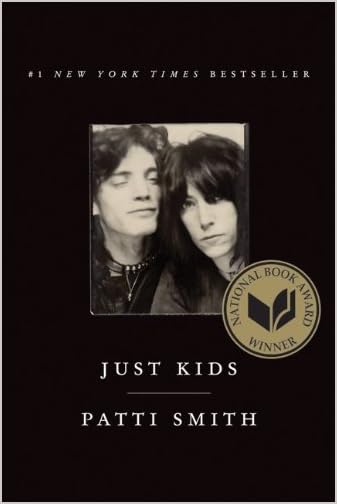 Patti Smith writes innocently. She reads in a fluid way, the way a skateboarder must feel when the ricocheting of the wheels against the ground is lost to the smooth ride. It feels like Patti escaped the noisiness of the world, but not without difficulty. She knows of it, but lives beyond it.
Patti Smith writes innocently. She reads in a fluid way, the way a skateboarder must feel when the ricocheting of the wheels against the ground is lost to the smooth ride. It feels like Patti escaped the noisiness of the world, but not without difficulty. She knows of it, but lives beyond it.I can't echo her writing through metaphor as well as a reader can decipher it through "Just Kids". Overall an ode to Robert Mapplethorpe, the book speeds through adolescence into young adulthood in mid-60's New York. Andy Warhol fanaticism, Martin Luther King's death, Jimi Hendrix being cool, Janis Joplin's insecurities, and other folklore play out in first hand.
Life just happened to Patti Smith, and she didn't struggle against it. She was lost and hungry and destitute, but kept going for the sake of art. I was sucked in by this struggle and couldn't stop reading, trying to figure out what this esoteric term that couldn't be seen or defined meant to her. Art in some sense was god, though the religious relation was never mentioned.
I couldn't relate to her hardship because I always found a practical solution for it. When Robert went through withdrawal, why did she take him to the Chelsea Hotel and not to Saint Vincent's? Why didn't she ask Janis Joplin or Jimi Hendrix to see her work and sponsor her? I was continuously drawn to her lack of finding a solution and letting circumstance suit her pace of life. Maybe she happened to life, because she would reject offers to sing or read her poems when they didn't feel right. She would pursue acting, though she didn't have any experience in it.
Patti and Robert had an approach to life that didn't at all make sense to me. I think that's the point. Patti wrote "Just Kids" to show the simple sinusoidal flow of life. Not just the content, but also the writing echoed that sentiment. There was no meaningful conveyance of "follow my route". There was no way you could anyway. No ego, no audience to write to, no publisher to impress. I'm reminded of Anna Nalick's "2 am" when she says she had to get a song down on paper before it threatened the life it belonged to. That's probably what Patti felt.
She was asked to write about her time with Robert by Robert and though you knew it the whole time, she only shared that at the end. This didn't have to be published for her to feel the work was complete.